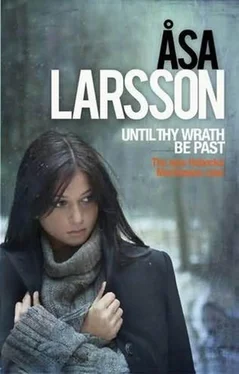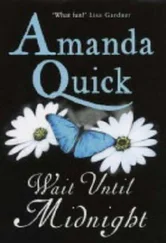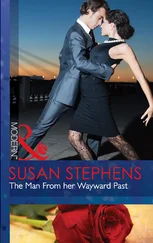The word spreads like water beneath late-winter snow.
Mella and Martinsson arrived back at the police station at 12.30.
“I’d love to go looking for that shed door,” Mella said as they were getting out of the car. But it would have to wait. The ice was too unreliable to walk on. Almost half a metre thick, but there was still a danger of falling through it. “I wonder if Krister Eriksson would be able to put Tintin on the trail of a wooden door?
“I’m sure he could,” she replied to herself. “I think that dog makes him porridge every morning.”
“What happened to his face?” Martinsson said.
“I’m not sure,” Mella said, “but according to what I’ve heard, admittedly not from him directly…”
She came to a sudden stop.
“What’s the matter?” Martinsson said.
Following Mella’s gaze, she saw Hjalmar and Tore Krekula sitting in their car in the police-station car park. When they noticed Mella, they got out and came towards her. Mella could feel her stomach churning with fear and anger. She thought about Jenny, her daughter.
“I just thought I’d inform you,” Tore Krekula said, “that we’ve been to see your boss to complain about police harassing people in Piilijärvi.”
“How…” Mella said.
“It’s your attitude,” Tore said. “You march round the village acting so damned superior, and people feel they are being accused and harassed. Lots of us feel that way. And lots of us are going to complain to your boss.”
“Do that,” Mella said, looking him straight in the eye. “Done much texting lately?”
“Sure,” Tore said casually, returning her gaze.
Neither of them looked away.
In the end Martinsson took Mella by the arm.
“Come on,” she said.
She looked hard at Hjalmar.
Hjalmar put his hand on his brother’s shoulder.
Martinsson and Hjalmar Krekula stood there like two dog owners, each with their pit bull terrier on a lead.
In the end Mella allowed herself to be led away. Tore shrugged off his brother’s hand.
“Shall we go?” Hjalmar said.
Tore spat in the snow.
“Bitch,” he called after Mella as she entered the police station.
His mobile rang and he answered it. Listened for a while without speaking. As he hung up he said, “Let’s get going. Time to pay Hjörleifur Arnarson a visit.”
I’m at Anni’s. She’s gone down to the lake on her kick-sledge. The sun is hiding behind the treetops. There’s been a midday thaw, and there’s a strange, magical haze above the lake.
She hears a hare scream on the far shore. It sounds like the cry of a little baby. Ghostly through the haze. The hare was probably taken by a fox. Hares get careless in the mating season.
There are some who sacrifice their lives for love, she thinks.
As that thought comes to her, she becomes aware of her sister standing behind her.
Kerttu. Also on her kick-sledge, she parks next to Anni and gazes out over the lake.
“You shouldn’t talk to the police,” she says. “You shouldn’t let them in.”
Anni says nothing. I try to glide in between them, but there are so many threads connecting the two sisters.
Anni doesn’t turn her head. Instead she sees Kerttu in her mind’s eye. The Kerttu she is looking at is young and smooth-skinned. It doesn’t seem that long ago, but in fact more than sixty years have passed.
It is May 1943. Kerttu is on her way home, her hair in curlers, expecting Isak Krekula to pick her up in his lorry. She is sixteen years old. A lot of years will pass before she weeps over the loss of her son in the forest. Isak Krekula is twenty-two, but already owns eight lorries, has his own haulage firm and several employees. For many years now he has been the hero of his village. He has transported supplies across the border into Finland, to both German and Finnish troops during the Winter War and the Continuation War against Russia.
He has returned home to the village full of adventure stories. Sat in people’s kitchens and recited the Swedish mantra “Finland’s cause is ours”, and perhaps sounded self-important, but his listeners have encouraged that. They have brewed real coffee, produced biscuits to dunk, and laughed when Krekula has told them about how he jokes with both the Finnish and the Swedish soldiers to keep their spirits up – after all, he speaks both languages fluently, just like the rest of the villagers. “I came to Kousamo. My God, but the lads were freezing. And hungry. I told them: ‘Those bloody Russkies will all have frostbitten arses, and perkele , they’ll starve to death.’ They couldn’t stop themselves laughing. Then we’d unload food and tobacco and weapons. There were tears in plenty of eyes, believe you me.”
The villagers would have been sitting by their wirelesses listening to reports from the front line; the women would have been knitting mittens and jumpers and socks for the Swedish volunteers. They would have handed the clothes over to Krekula for delivery to the troops, and would have felt extra-pleased when he came back and told them how the boys nearly ended up fighting over the jumpers the women had made, and how they sent greetings and thanked them all from the bottom of their hearts. “And they wondered if I couldn’t bring a few pretty unmarried girls with me next time.”
The volunteers had been welcomed back to Sweden with parades and receptions in town halls and cathedrals.
Krekula’s pockets are full of cash. He earns a lot of money from these transports. His haulage firm grows bigger and bigger. But nobody begrudged him that before the winter of 1943.
Then comes Stalingrad, and the tide turns against the Germans. Foreign Minister Christian Günther, who had urged Sweden to follow the example of Finland and support the Germans against the Soviet Union, had backed the wrong horse. Sweden supports the allies. Finland’s cause is not ours, dammit. Finland is a German lackey.
Now the returning volunteers are greeted with silence and averted eyes. Krekula still transports goods across the border, but he no longer circulates around the kitchens of the village. He takes Kerttu with him in his lorry. They have been going steady since she was fourteen, and she is as pretty as a picture. Spends ages posing in front of her mirror and avoiding doing any chores, and Anni is tempted to give her a good smacking. Krekula seldom comes in to say hello, hangs around in the road instead. Matti, the girls’ dad, looks away and growls grumpily when Kerttu bids them a hasty goodbye and runs outside. He keeps the family going on the little he earns from farming and fishing. But he feels the shame of the poverty-stricken when his daughter comes home with a new dress that Krekula has bought her, or a fancy headscarf or some perfumed soap. Anni and her mother are a stark contrast to all that finery. If the family were better off, perhaps Kerttu would not be so head-over-heels in love – but what can Matti do?
Kerttu continues to strut through the village and couldn’t care less what people say. Not that they dare say very much, as several of the local men drive lorries for Krekula and others are involved in building him a new garage. The bottom line being that they all need to earn a living.
But Anni knows about the gossip. One day when she is visiting one of the families in the village, the youngest daughter catches sight of Kerttu through the window. She starts singing, “If you want to see a bright star, look at me”. One of her sisters immediately shuts her up and gives Anni a look combining shame and scorn. She does not apologize. Anni knows that the song is often sung behind Kerttu’s back.
The singer who made it popular, Zarah Leander, is out in the cold now, hated by everyone for fraternizing with the Nazis. On the other hand, the anti-fascist composer and revue artist Karl Gerhard’s songs are being played on the wireless again. The wind changes direction rapidly. Kerttu is the village’s little Zarah Leander.
Читать дальше












